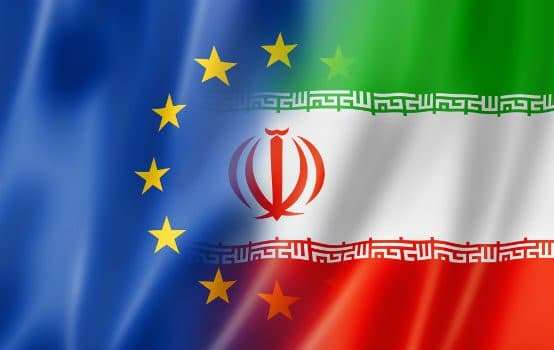
Iranian hardliners have always been pessimistic about the West, arguing that the governments there have “ominous” plans for Tehran, which they seek to stab in the back. That impression has certainly been reinforced this past year, as America pulled out of its own hard-won nuclear deal and Donald Trump on Sunday threatened Iran with “CONSEQUENCES THE LIKES OF WHICH FEW THROUGHOUT HISTORY HAVE SUFFERED” on Twitter.
But a new round of talks between Iran and three European countries (the UK, Germany, and France) have opened a possible new window of opportunity to soften the hardliners’ view about cooperation, with Europe if not the United States.
Since President Donald Trump’s decision in May to exit the 2015 nuclear deal, Europeans have come forward and stated firmly that they oppose Washington’s actions. In various joint statements, the European Union and the three major European powers announced that they would strive to keep Iran in the deal, as Tehran had threatened to leave the agreement if its interests weren’t guaranteed.
Following these declarations, Europe and Iran started a new round of talks in order to save the JCPOA, which took more than a decade to be negotiated. Tehran is now seeking guarantees that its oil sales and access to Western banking systems will be preserved, as Trump has vowed to impose heavy pressure and sanctions on the Iranian economy.
- What I Saw in Post-Nuclear Deal Iran
- Is Washington Playing Iran’s Useful Idiot in Syria?
Meanwhile, hardliners in Iran are rebuking reformists who had promised that the nuclear deal and other interactions with the West would solve the country’s problems. Putting faith in Europe, some of the radicals declare, will prove as foolhardy as did trusting the United States.
But while the hardliners are voicing their skepticism, it seems some of them are still hopeful about Tehran and Europe reaching a deal. Ironically, should that deal be achieved, the moderate government will face fewer obstacles from the radicals as it seeks to open Iran up to the world.
During Tehran’s Friday prayers on May 11 when a group of people started chanting against a number of European countries, the hardline prayer leader stopped them and asked them to chant only against the U.S. and Israel.
Moreover, a number of ultra-conservative figures have indicated that they aren’t opposed to the talks and even to a new agreement, even though they are generally dubious about Europe.
The commander of the hardline Islamic Revolutionary Guards Corps (IGRC), General Mohammad-Ali Jafari, stated on May 13: “Europeans have announced that they can’t resist the U.S. sanctions. Now, an opportunity has been given to the Europe but they should provide guarantees, but I [think of it] as unlikely.”
Furthermore, Ayatollah Seyyed Hashem Hosseini Boushehri, the Qom Friday prayer leader, noted on May 18: “The results of continued talks with Europeans shouldn’t be like the U.S. withdrawal from the JCPOA, and the interests through the JCPOA should be protected.”
The influential Grand Ayatollah Makarem Shirazi also said on June 28: “Today, America is isolated more than anytime [in the past] and we are witnessing that Europeans haven’t cooperated with the Americans on the issue of withdrawal from the JCPOA, and this issue is very important.”
More importantly, Iran’s Supreme Leader Ayatollah Ali Khamenei, who has the final say on foreign policy issues, hasn’t stopped the government from talking to European delegations, instead calling for developed ties with the West.
“Except for a few cases, such as the U.S., the country’s relations with the East and the West should be enhanced as more as possible,” Khamenei said on July 16.
These statements are in disagreement with what hardliners have been urging since the American withdrawal from the JCPOA. In the wake of Trump’s decision in May, Iranian conservatives urged the government to turn to East. In this vein, the hardline Javan newspaper quoted Russian President Vladimir Putin telling Ayatollah Khamenei in 2015: “We have thought of our relationships with you as tactical. We know that there are figures who say that we may sell you out to the West. [But] Russia won’t [turn away] from Iran as a strategic ally.”
Nonetheless, Khamenei’s recent speech may be a green light to the moderate government of Hassan Rouhani as it enhances ties with Europe. Thus does a new chapter of relations between Iran and West, excluding America, open.
Iran’s political establishment seems to look at the new talks with Europe as a test of how far they can go while maintaining their obligations to the Islamic Republic. If the new negotiations yield positive results, the path for continued negotiations will be paved.
Before leaving Tehran for his European tour, President Rouhani remarked on July 2: “There are some regional issue that we have talked to Europe and will continue these talks about the role Iran can play in stability and security of the whole important region of Middle East.”
In sum, if a new agreement is achieved between Europe and Iran to save the 2015 deal, a new inclination towards broader cooperation on a variety of issues might be realized. The result of fruitless talks, however, could be that Iran embraces Russia, an outcome it doesn’t want but that Donald Trump may have made more likely.
Rohollah Faghihi is a Tehran-based journalist who has worked for various Iranian media outlets including Entekhab news. He is also a contributor to Al-Monitor.
Sourse: theamericanconservative.com






